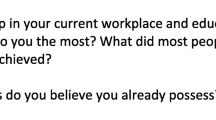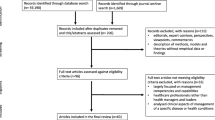Abstract
Objective
The significance of physician leadership to help transform the healthcare system has been increasingly discussed. This study looked at the qualities of emergency medicine (EM) physicians that support or inhibit their work as healthcare leaders.
Methods
Through an iterative process of semi-structured interviews and then focus groups, we examined why EM physicians pursue leadership roles, the strengths they bring and the frustrations they encounter. Thematic analysis identified factors that facilitate and inhibit the work of EM physicians as they enter leadership roles.
Results
These findings can be summarized in four key themes. (1) A desire to improve the wider health system was often a prime motivator for entering a leadership role. (2) EM physicians’ clinical skills such as confident decision-making, relationship building through communication, and comfort with uncertainty supported their successful transition to leadership. (3) EM physician leaders perceived shiftwork as both a potential benefit and a challenge in their leadership role and felt it needed to be carefully managed to ensure personal wellness and success. And (4) participants were not driven to take on leadership positions by financial remuneration but stated that the discrepancy between EM clinical and leadership compensation was a point of stress.
Conclusion
As physician leadership is explored as a mechanism to support the healthcare system’s success, this project provides insights into the realities experiences by EM physicians and considerations for healthcare professionals as they encourage physicians into leadership positions.
Résumé
Objectif
L’importance du leadership des médecins pour aider à transformer le système de santé est de plus en plus discutée. Cette étude s'est penchée sur les qualités des médecins urgentistes (MU) qui soutiennent ou entravent leur travail en tant que leaders dans le domaine des soins de santé.
Méthodes
Grâce à un processus itératif d'entretiens semi-structurés puis de groupes de discussion, nous avons examiné les raisons pour lesquelles les médecins spécialistes en médecine d'urgence assument des fonctions de direction, les forces qu'ils apportent et les frustrations qu'ils rencontrent. L'analyse thématique a permis d'identifier les facteurs qui facilitent et inhibent le travail des médecins en médecine d'urgence lorsqu'ils accèdent à des fonctions de direction.
Résultats
Ces résultats peuvent être résumés en quatre thèmes principaux. 1) Le désir d’améliorer le système de santé dans son ensemble était souvent une motivation majeure pour accéder à un rôle de leadership. 2) Les compétences cliniques des médecins en médecine d'urgence, telles que la prise de décision en toute confiance, l'établissement de relations par la communication et l'aisance face à l'incertitude, ont favorisé leur transition réussie vers le leadership. 3) Les médecins leaders en médecine d'urgence percevaient le travail posté comme un avantage potentiel et un défi dans leur rôle de leadership et estimaient qu'il devait être géré avec soin pour assurer le bien-être et la réussite personnels. Et 4) les participants n'ont pas été incités à occuper des postes de direction par la rémunération financière, mais ont déclaré que l'écart entre la rémunération clinique et la rémunération de la direction de MU était un point de stress.
Conclusions
Alors que le leadership des médecins est considéré comme un mécanisme de soutien au succès du système de santé, ce projet donne un aperçu des réalités vécues par les médecins en médecine d'urgence et des considérations pour les professionnels de la santé qui encouragent les médecins à occuper des postes de direction.
Similar content being viewed by others
Data availability
The data presented in this paper is not publicly available to protect the privacy of the participants. Please reach out to the corresponding author with all inquiries.
References
Collins-Nakai R. Leadership in medicine. McGill J Med. 2006;9(1):68–73.
Ham C. Improving the performance of health services: the role of clinical leadership. The Lancet. 2003;361(9373):1978–80.
Grady CM, Hinings CB. Turning the Titanic: physicians as both leaders and managers in healthcare reform. Leadersh Health Serv. 2019;32(3):338–47. https://doi.org/10.1108/LHS-09-2017-0058.
Lazar H, Forest PG, Church J, Lavis JN, editors. Paradigm freeze: Why it is so hard to reform health care in Canada? McGill-Queen’s Press-MQUP; 2013.
Guptill M, Reibling ET, Clem K. Deciding to lead: a qualitative study of women leaders in emergency medicine. Int J Emerg Med. 2018;11(1):1–10.
Lateef F. Grace under pressure: leadership in emergency medicine. J Emerg Trauma Shock. 2018;11(2):73–9.
Sinclair D, Worthington J, Joubert G, Holroyd B, Stempien J, Letovsky, et al. CAEP 2015 Academic Symposium: leadership within the emergency medicine academic community and beyond. Can J Emerg Med. 2016;18(1):1–9. https://doi.org/10.1017/cem.2016.9.
Helman A, Ovens H, Campbell S & Innes G. Episode 129 ED overcrowding and access block—Causes and solutions. Emergency Medicine Cases; 2019. Available at https://emergencymedicinecases.com/ed-overcrowding-access-block-causes-solutions/
LaSalle G. Leadership and the emergency department. Emerg Med Clin. 2004;22(1):1–18.
Lowe DJ, Ireland AJ, Ross A, Ker J. Exploring situational awareness in emergency medicine: developing a shared mental model to enhance training and assessment. Postgrad Med J. 2016;92(1093):653–8.
Stempien J. Understanding emergency medicine physician leadership within the Saskatchewan health authority [master’s thesis]. Royal Roads University; 2023.
Bradbury H, Reason P. Action research: an opportunity for revitalizing research purpose and practices. Qual Soc Work. 2003;2(2):155–75.
Coghlan D, Brydon-Miller M. Doing action research in your own organization. 5th ed. Sage; 2018.
Cooperrider DL, Godwin L. Positive organization development: Innovation-inspired change in an economy and ecology of strengths. In: Cameron K, Spreitzer G, editors. Oxford handbook of positive organizational scholarship. Oxford University Press; 2011. p. 737–50.
Stroh DP. Systems thinking for social change. Chelsea Green; 2015.
Fusch PI, Ness LR. Are we there yet? Data saturation in qualitative research. Qual Report. 2015;20(9):1408–16. https://doi.org/10.4674/2160-3715/2015.2281.
Guest G, Bunce A, Johnson L. How many interviews are enough? An experiment with data saturation and variability. Field Methods. 2006;18(1):59–82.
Braun V, Clark V. Using thematic analysis in psychology. Qual Res Psychol. 2006;3(2):77–101.
Braun V, Clarke V. One size fits all? What counts as quality practice in (reflexive) thematic analysis? Qual Res Psychol. 2020;18(3):328–52. https://doi.org/10.1080/14780887.2020.1769238.
Bloor M, Frankland J, Thomas M, Robson K. Focus groups in social research. Sage; 2001.
Krueger RA. Focus groups: a practical guide for applied research. Sage Publications; 2014.
Onwuegbuzie AJ, Dickinson WB, Leech NL, Zoran AG. A qualitative framework for collecting and analyzing data in focus group research. Int J Qual Methods. 2009;8(3):1–21.
Rutledge T, Sinclair D. Your profession needs you (lessons in medical leadership). Can J Emerg Med. 2013;15(2):67–72.
Snowden DJ, Boone ME. A leader’s framework for decision making. Harvard Bus Rev. 2007;85(11):68–76.
Wisetborisut A, Angkurawaranon C, Jiraporncharoen W, Uaphanthasath R, Wiwatanadate P. Shift work and burnout among health care workers. Occup Med. 2014;64(4):279–86.
Shields M. Shift work and health. Health Rep. 2002;13(4):11–33.
Ganesan S, Magee M, Stone JE, Mulhall MD, Collins A, Howard ME, et al. The impact of shift work on sleep, alertness and performance in healthcare workers. Sci Rep. 2019;9(1):1–1. https://doi.org/10.1038/s41598-019-40914-x.
Sun J, Stewart P, Chiew A, Becker T, Siu W, Varndell W, Chan BS. Association between shift work and cognitive performance on the Trail Making Test in emergency department health officers. Emerg Med Aust. 2021. https://doi.org/10.1111/1742-6723.13753.
Berger AM, Hobbs BB. Impact of shift work on the health and safety of nurses and patients. Clin J Oncol Nurs. 2006;10(4):465–71. https://doi.org/10.1188/06.CJON.465-471.
Snell AJ, Dickson G, Wirtzfeld D, Van Aerde J. In their own words: describing Canadian physician leadership. Leadersh Health Serv. 2016;29(3):264–81.
Author information
Authors and Affiliations
Corresponding author
Ethics declarations
Conflict of interest
The authors have no conflicts of interest to disclose.
Rights and permissions
Springer Nature or its licensor (e.g. a society or other partner) holds exclusive rights to this article under a publishing agreement with the author(s) or other rightsholder(s); author self-archiving of the accepted manuscript version of this article is solely governed by the terms of such publishing agreement and applicable law.
About this article
Cite this article
Stempien, J., Gibson, M. & Harrison, A. “We want to change the system”: a qualitative study on emergency medicine physician leadership. Can J Emerg Med 26, 266–270 (2024). https://doi.org/10.1007/s43678-024-00667-7
Received:
Accepted:
Published:
Issue Date:
DOI: https://doi.org/10.1007/s43678-024-00667-7




